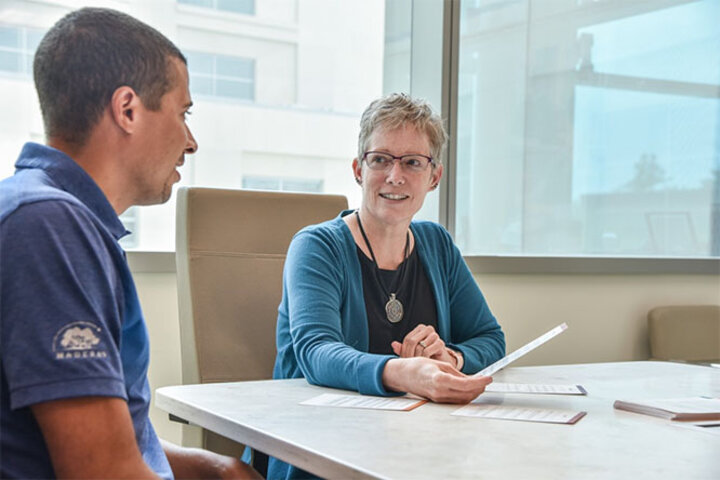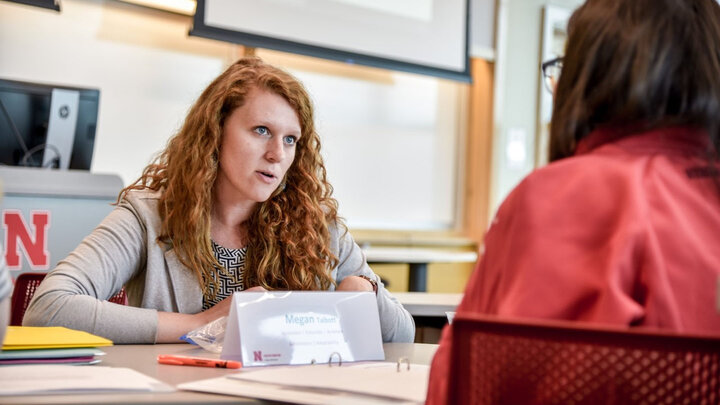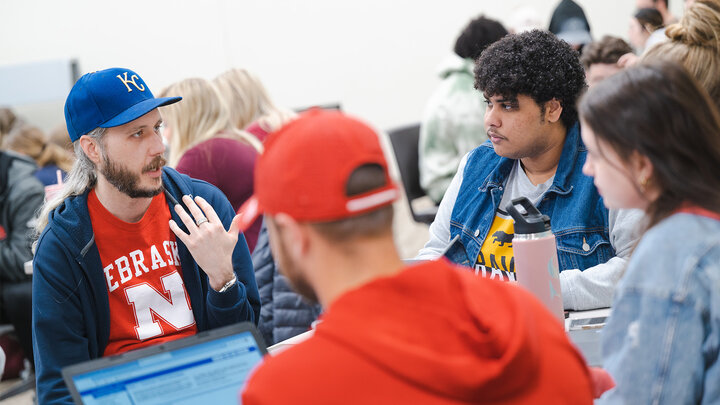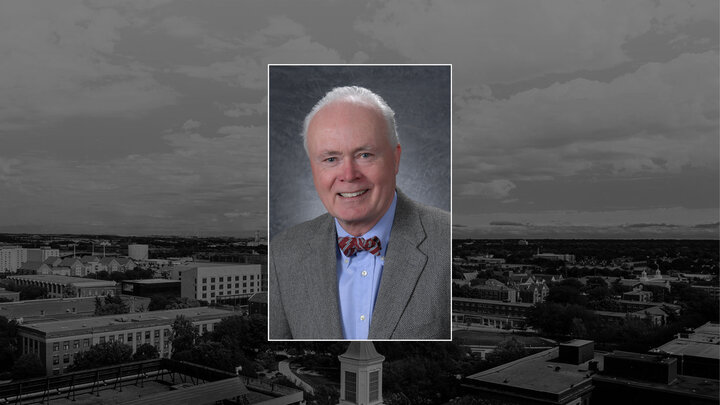The need for students, faculty and staff at the University of Nebraska-Lincoln to lead with and rely on their strengths became paramount while navigating change around COVID-19. Gallup-Certified Strengths Coaches and trained student coaches at the College of Business provide support during this time of uncertainty.
“Our strengths and talents are our go-to behaviors. Leaning into what is easy is one of the most compassionate things you can do for yourself when things feel uncertain or stressful. Doing so in a productive way can give you a positive feeling of success to build on,” said Deb Eisloeffel, human resources manager and Gallup-Certified Strengths Coach at the College of Business.
Samantha Kennelly, associate director of the college’s Clifton Strengths Institute, teaches Strengths Coaching, Theory and Practice (MNGT 451). This spring, she also co-leads the new Advanced Strengths for Coaches and Managers (MNGT 398) course, which provides advanced development for certified student strengths coaches who plan to be managers.
“With a shift in our everyday lives, we can lose sight of our purpose, and thus, our motivation to continue to be productive and perform at our best. I ask those I am coaching, ‘Which CliftonStrengths are shining now?’ and ‘Which ones have you tapped into to navigate this change?’ to remind them they have talents and tools within them to help pivot and create a path forward that works for them. Once we know what motivates and drives our actions, we can make effective changes in order to adapt and keep moving forward,” Kennelly said.
Eisloeffel also shared questions she asks when coaching staff to gain insight. They include:
- What’s already going well and how are you making that happen?
- What would your ideal situation look like today, tomorrow or next week?
- What positive behaviors could help you achieve the best outcomes?
- Who can help you and what is the best way for you to reach out to them?
“The last question may be a challenge for those with a lot of relational strengths as they worry about disrupting others if they need more connection than usual. It also may be a challenge for those with fewer relational strengths, because they might believe they shouldn’t have to rely on others. In either case, the key is be aware of what you need and lean into it. It’s all right to ask for help,” Eisloeffel said.
Kennelly added how everyone needs human connection regardless of their dominant strengths. However, it’s the level needed which may be different for each person.
“When we don’t have human connection, we may lose some of our energy to be productive and celebrate our accomplishments. During this time of social distancing, we all are exploring new ways to connect with family, friends and colleagues. It’s been inspiring to hear about how our students are prioritizing ways to connect with people,” she said.

Kennelly shared stories about how students prioritize ways to connect with people. One student with Individualization and Positivity handwrites letters for her classmates to provide joy. Another uses her Significance and Futuristic to network with potential professional mentors through Husker Connect, an online platform for students, alumni and professionals to actively connect.
Entrepreneurial students in the Clifton Builders Program found a virtual way to stay connected. The cohort of 30 schedule Zoom calls weekly to share stories and life updates.
Collin Smith, a freshman biology major from Houston, Texas, first heard about strengths when two upperclassmen encouraged him to become a student coach at Nebraska Business. Smith took their advice and his new understanding of his strengths helped him deal with the abrupt changes these past six weeks.
“During the circumstances surrounding COVID-19, I didn’t miss a step. I use my Achiever to push toward goals of success every day, as accomplishing tasks improves my mood and helps me adjust to the new challenges. My Competition guides my desire to become better than I was yesterday,” Smith said. “By knowing my strengths and investing time into developing them, I can better myself and serve others in the future.”
Erika Casarin, a sophomore management major from Lincoln, Nebraska, decided to focus on coaching in order to help others. She took the CliftonStrengths Assessment in PrEP I: Investing in Strengths (BSAD 111) as a freshmen and found the benefits life changing.
“Strengths brought to light the power of understanding myself. I coach because when we find the greatness within one another, our solidarity can create ripples of service, hope and connected humanity. The very act of uniting through strengths connects us and I want others to understand they are not alone,” Casarin said.
Kennelly said these new coaches will provide integral support to the new fall 2020 students, who experienced something no one could have prepared them for prior to entering the next stage of their life. The time leading up to their first year in college includes a mix of emotions from loss and confusion to uncertainty and hurt.
“Our coaches will be even more vital to these incoming students who experienced the cancellation of graduation, prom, sporting events, trips and the opportunity to soak up their senior year and reflect on their past four years with their closest friends. This shared experience will enhance the coaching relationship and provide even more support to help understand what they can learn from this experience, so they can be resilient and thrive,” she said.
Faculty and staff who suddenly needed to teach and work remotely also benefit from strengths coaching. Through the support of administration at Nebraska Business, more than 40 faculty and staff previously trained to become Gallup-Certified Strengths Coaches.
Garrett Stolz, ’17, writing and photography coordinator in the Communications, Marketing and External Relations office at Nebraska Business, decided to review his strengths during the transition to working from home.
“The college encouraged us to do professional development and I wanted to use my strengths to self-guide me during what sometimes can be a difficult and lonely time. Since I get energy from being around people, Deb Eisloeffel was a tremendous help by discussing how to build habits at home to keep me motivated throughout the day,” Stolz said.
The two discussed how he could use his Adaptability to change his daily routines so he didn’t feel stuck in a rut. He also schedules time to connect with family, friends and colleagues by phone and Zoom due to his relational strengths.
“I’m happy I reached out to discuss my strengths, because what we talked about helped me get through this situation easier. I’m glad the college is also supporting us – faculty, staff and students – during these uneasy times,” he said.
To learn more about the Clifton Strengths Institute, visit: https://business.unl.edu/strengths.




